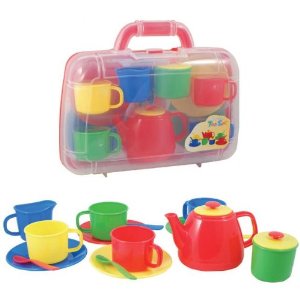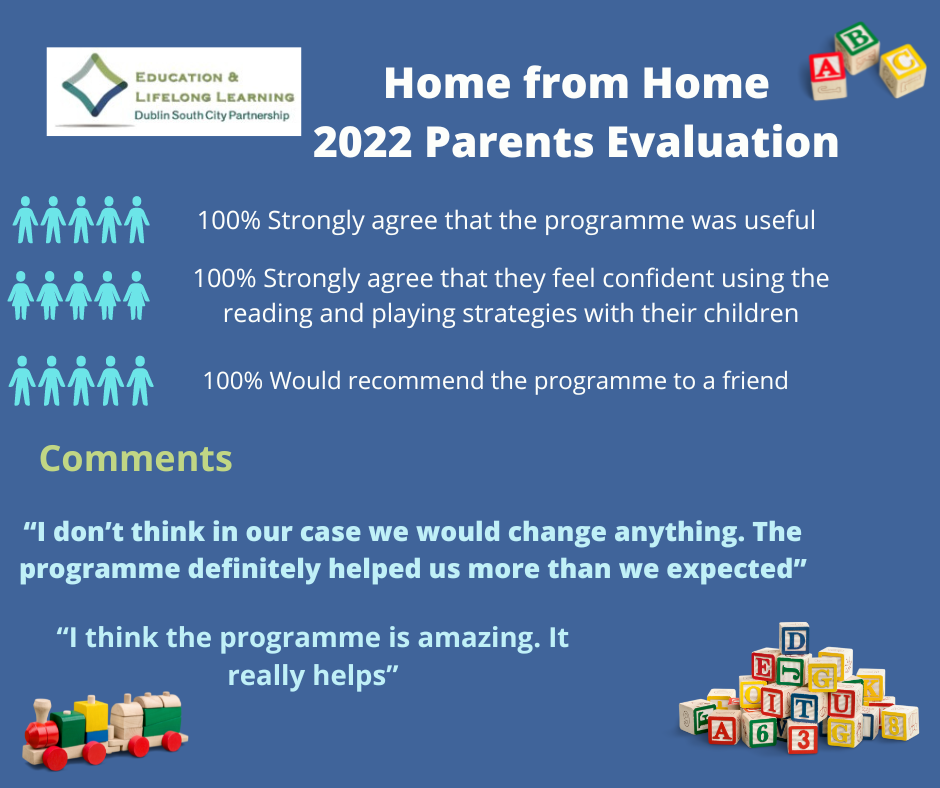Primary Theme: Goal Two Project
The programme falls under the following Social Inclusion and Community Activation Programme (SICAP) programme goal, thematic area and target outcomes and group:
| Programme Goal | Goal 2 – Supporting Individuals – ‘To support disadvantaged individuals to improve the quality of their lives through the provision of lifelong learning and lab our market supports.’ |
| Thematic Area | G2.2 – SICAP Clients Participate in Lifelong Learning. |
| Target Outcomes | G2 3:2 Disadvantaged children and their families are supported in education, employment and personal development |
| Target Group | Disadvantaged children and families. |
Dublin South City Partnership – DELIVERY of The Home From Home Programme
Demonstration of Work SICAP 2018 -2023
Contents
Home from Home – Programme Inception 3
Home from Home – Programme Structure 4
Home from Home – Dublin South City Partnership Roll Out 5
Background
As highlighted by David Whitebread (2012) “Play is sometimes contrasted with work and characterised as a type of activity which is essentially unimportant, trivial and lacking in serious purpose”. However, the value of play is increasingly recognised as of vital importance, particularly for young children. “The most recent neuroscience or brain research confirms the power of play for brain development. The brain grows fastest in the first 5 years of life and the wiring of the brain makes multiple and complicated neuron connections that in many ways decide our future ability to learn, achieve and be happy. Play helps the brain to make these connections because it allows free reign to the imagination and consequently children can engage in new experiences, activities, roles, and relationships on an on-going basis.” (Early Childhood Ireland)
As outlined by the HSE, play helps children develop their memory, thinking and reasoning skills. During play, children between 2 and 3 will learn how to.
- Use their imagination.
- Count.
- Tell the difference between different shapes and sizes.
The Growing up In Ireland study highlighted the importance of early intervention and highlighted the first months and years of a child’s life as some of the most formative. Development from the pre-natal age to 4 is a solid indicator of future outcomes for a child. (Williams et al, 2009) For children from disadvantaged backgrounds, where parents oftentimes to not have the resources to facilitate play and development, when started school they can be up to as much a one and half years behind their middle-class counterparts in terms of literacy and numeracy. (Harvey, 2014)
Dublin South City Partnership (DSCP) recognise the importance of early intervention, particularly within the communities that the SICAP programme support. These communities particularly in areas such as Dublin 8 and Dublin 12 have a long history of early school leaving and intergenerational unemployment. Other social issues that are prevalent in these communities include, drugs, alcohol, and homelessness.
The DSCP Lifelong Learning team since 2009 have had the ParentChild+ Programme (formerly Parent Child Home Programme) as a cornerstone of its work with at risk children and families. Originating in America and adopted by the National College of Ireland (NCI) for the Irish Context, Parent Child+ is an evidence-based programme, which promotes learning through play for parents and toddlers. The programme aims to give children a head start, and prepare them for later success in school, whilst also strengthening the bond between parent and child through the implementation of play-based learning.
Whilst the programme has been largely successful, the emerging homelessness crisis has led to a revaluation on how the programme can fit the needs of those families experiencing housing insecurity. In July 2022 the number of homeless families in the country rose to 1,423 in a crisis that continues to worsen due to affordability and lack of availability. Getting the supports right for these families is crucial when they are faced with stress and anxiety caused by the uncertainty of homelessness.
This case study will focus on the DSCP roll out of the Home from Home Programme, an adaptation of ParentChild+ that was designed in response to the needs of those living in Family Hubs.
Home from Home – Programme Inception
As aforementioned the ParentChild+ programme has underpinned the work of the SICAP Life Long Learning Early Years Worker. Although the programme has primarily been externally funded due to its resource heavy nature, SICAP staff have provided vital logistical support, and developed relationships that have been instrumental in the success of the DSCP roll out.
SICAP staff have also supported and trained a team of home visitors to deliver the ParentChild+ Programme.
The programme is run during the school year, and as previously noted facilitates learning through play. The team of trained home visitors visit targeted families twice weekly in their own homes, and model play with the aid of developmentally appropriate books and toys. The families who take part in the programme keep the toys and books that are introduced as part of the programme, with parents encouraged to continue to play with their children in the way that was modelled to them by their designated home visitor. It is hoped by developing these skills early with parents and children that literacy and numeracy will be improved, and children will be better prepared to enter the formal education environment.
In a review of their own ParentChild+ Programme the Early Learning Initiative of NCI observed a lower attendance rate/early drop off rate in families experiencing homelessness.
In exit interviews with these families, some of the reasons put forward were (Home from Home Manual, 2020)
- The number of visits to complete the programmes were too long of a commitment for families who may be moving from one hub to another, or in some cases outside of ELI catchment area.
- The number of appointments each week was too hard to keep considering the many other appointments families had with housing, social care, health appointments etc.
With the levels of homelessness rising, the Early Learning Initiative felt it imperative to provide a programme to respond to the unique needs of families living through the crisis as part of its ongoing development strategy.
The Home from Home Programme was developed after much conversation, and feedback from active home visitors around the specific needs of families experiencing homelessness. Home from Home is an adapted version of the Parent Child+ that provides shorter, intensive sessions with the aim of alleviating the pressure felt by the families involved.
The Home from Home Manual developed by the Early Learning Initiative of NCI outlines the objectives of the Programme as.
- To increase parental skills, knowledge, and engagement in all areas of their children’s development and learning.
- To provide materials and knowledge of services available to parents for them to successfully navigate the Irish systems (healthcare, housing, education).
- To provide resources and materials to create a learning and stimulating environment through our home visiting programme.
- To enable children and their families to experience a safe, secure, stable, caring, holistic, learning, and restorative environment in their temporary home, in services (statutory and community) and throughout the community.
Home from Home – Programme Structure
Home from Home is a twelve-week programme, which is targeted specifically at families living in homeless hubs/shelters. The programme is aimed at families with children aged 16 months to 4+ years, with the option of families transitioning to the Parent Child+ programme if deemed appropriate.
Participating families receive one hour long visit a week, and as with the Parent Child+ programme is designated a trained home visitor who models learning through play, using a range of developmentally appropriate books and toys.

The above are an example of the books and toys that are used as part of the programme.
In the case of the tea set, home visitors identify colours and explain to the child what each item is used for. The tea set is used to introduce new words into the child’s vocabulary such as “Pour” and “Stir”. Home visitors ask the child if they would like to “pour some tea”, observing the child’s ability to understand the new words and follow instruction. Home visitors actively encourage parents to join in and develop their child’s social skills by expanding the play. In the case of the tea set parents are encouraged to create a café using resources available to them, such as books that serve as a makeshift counter or teddy bears as café customers.
Home visitors do their best to create a quality learning environment that is conducive to cognitive growth and stimulation.
The Home Visitors additionally connect families to a range of community resources and services that the families might not otherwise know about or have the confidence to access. This increases possibilities for social integration and additional support.
Home visitors carry out parent and child assessments at the beginning and end of the programme cycle.
The Home from Home Manual outlines a strict criteria for family selection that must be adhered to by participating organisations. Family criteria are those living in;
- Homeless accommodation
- Sheltered/emergency accommodation
- Traveller halting site
- Direct provision
- Temporary accommodation
- And is not for settled families
Home from Home – Dublin South City Partnership Roll Out
As with many Local Development Companies throughout the country, DSCP is acutely aware of the rising levels of homelessness and housing insecurity in the communities that it supports. There two family hubs within the DSCP catchment area, and supports for the families that reside in these center’s has become a focus for the SICAP Early Years Worker.
Although family hubs serve to provide security and stability for families, SICAP staff have witnessed firsthand how families can struggle in the shared confines of the hubs, particularly those with younger children.
A report by the Ombudsman for Children (2019), obtained direct accounts of parents and children living in family hubs. Issues such as lack of space, lack of privacy, and feeling isolated dominated the feedback from those families who took part in the study.
As highlighted in the same document “parents of the under-fives identified additional challenges associated with having a normal life in family hubs. These included parenting; establishing and maintaining routines for children; lack of family support. Concerns for their young children’s physical and psychological development were also expressed.”
The Home from Home programme was for DSCP a relevant addition to the work already being carried out within the family hubs, and one that could provide tangible outcomes for those involved. Like with NCI the ParentChild+ programme was trialed in family hubs but the outcomes for DSCP aligned with those experienced in the inner city, namely high drop off rates. The table below how the Home from Home serves to meet the needs of this targeted group of SICAP clients.
| NEEDS | OUTCOMES |
Children
|
|
Parents
|
|
In 2021 DSCP, commenced the Home from Home Programme in two family hubs, one in Dublin 12 and one in Dublin 6W. The programme was also facilitated in the home of a migrant family with a child who presented with additional needs. The idea was that this programme would be used to bridge the gap between September 2021 and entering preschool. This child had not been able to attend preschools due to the lack of availability of preschool places/Access Inclusion Model (AIM) support. This type of situation was a common theme among the families who availed of the programme.
Eight families registered for the programme with five of these completing the twelve weeks. For the three families that did not complete, one moved out of the area, another child received a place in childcare, and one family disengaged. For the family that disengaged, home visitors and the SICAP Early Year’s Worker continued to link in and ensure they were aware of other supports that they could avail of.
A team of three DSCP employed home visitors delivered the 12-week programme in the aforementioned settings. In one family hub the library was used to facilitate the programme, whilst in the other hub home visitors were required to use an outside space because of Covid- 19 restrictions.
At the end of the programme, DSCP organised a graduation ceremony for the children and parents. The ceremony marked the achievements of the children and provided an opportunity for celebration and reflection.
The 2021/2022 programme funded primarily through an ESB Generation grant, with additional SICAP funding, allowing for extra resources.
Throughout the programme the SICAP Early Year’s Worker built key relationships with the family hubs staff, and was responsible for the logistical aspects of the programme such as;
- Linking in with the senior specialist in ELI/NCI around the suitability of referred families.
- Conducting intake meetings with partaking families.
- Providing guidance and support to home visitors.
- Administration relating to the programme.
- Ensuring adequate stocks of programme resources.
- Organisation of a graduation ceremony to mark the end of the programme.
Reflection and Learning
At the end of the programme, the parents involved completed an evaluation. Below are some of the findings and feedback from these evaluations.
In June 2022 the three participating home visitors took part in an evaluation meeting where they reflected on their experience of rolling out the programme.
One home visitor delivered the programme in the home environment. This particular child had cerebral palsy and the home visitor and SICAP Early Year’s Worker advocated on behalf of the family and secured a childcare place and an AIM worker. As noted by the home visitor;
“This was an invaluable support to the family. If they were not on the programme, they wouldn’t have had these supports.”
This home visitor also helped the family with filling out forms and supported them in linking in with social welfare.
Another home visitor who facilitated the programme in a family hub noted that;
“If children did not have the Home from Home programme, they would have no educational supports that are so important during their early years.”
This home visitor felt that the hour was transformative for both the parents and children involved.
“It really helped with their English, listening and observing.”
As well as learning supports this home visitor highlighted the importance for families in seeing a friendly face every week. She felt that parents appreciated the non- judgemental environment and felt supported.
Another home visitor who delivered the programme in a family hub, outlined some of the complex and difficult situations that she and the SICAP early years worker were able to support families through.
“One family on the programme was facing deportation, and Home from Home provided routine and a supportive environment in an extremely anxious time for the parent.”
For this home visitor, accessing the interior of the family hub was not an option which led to sessions being delivered outside. This provided extra challenges, and when it rained the sessions were moved online which did not have the same impact as those delivered in person.
Two of the home visitors also noted cultural shifts during the twelve weeks. One home visitor was pleased to see men taking part, particularly those from cultures where engagement with their children in this kind of way is not always encouraged.
Another home visitor provided an example of how a parent’s attitude changed, in relation to her young son.
“A mum didn’t want her young boy playing with a doll. Her attitude relaxed when she saw how much enjoyment he was getting from the doll. She sent me a photo one night of the child snuggled with the doll and she said, “I should have let him have the doll from the start.”
In terms of overall positives and negatives the three home visitors agreed on the following.
Positives
- Increase in confidence for both parents and children.
- Improved literacy levels for children and improved English language skills for both parents and children.
- Things that families can’t have in their rooms they are allowed to play with during the session. This helped to relieve frustration and tension. i.e., children were allowed to use playdough and other materials that are deemed too messy for bedrooms.
- Many parents are anxious and depressed – the programme allows for them to have space and time to bond with their children without distractions.
- Advocacy – families feel supported and better connected with their new communities.
- The programme serves to counteract some of the isolation felt by families residing in the hubs.
Negatives
- Lack of communication between home visitors and family hubs – oftentimes the home visitors found themselves in “deer in the headlights” situations” whereby families were upset and seeking support on issues that home visitors had no previous awareness of.
- Literature around the programme needs to be more inclusive – contracts etc. need to be made available in different languages.
- High turnover of staff in family hubs makes it difficult for home visitors to get a handle on what’s going on for families and improve communication.
Suggested changes for future programmes
- More clarification on role – in terms of advocacy what is within the home visitors remit.
- More training for home visitors – specifically around trauma and mental health.
- Suggestion to extend the programme. Home visitors felt that 12 weeks was too short. More sessions would ensure maximum impact for both parents and children.
- Programme literature to be translated into different languages.
Conclusion
The Home from Home programme has greatly expanded DSCP’s supports for those experiencing homelessness. The programme has dual benefits in that it supports both children and parents and provides tangible outcomes for both. Home from Home has served to increase literacy levels in the children involved, increase the comprehension of English language for parents and children, and provide important advocacy supports for families facing stress and anxiety caused by housing insecurity.
The delivery of the programme within the family hub setting has allowed for DSCP to build important strategic relationships with the staff who are working directly with families experiencing homelessness. Having these relationships will hopefully allow for the future roll out of Home from Home, as well as facilitating the introduction of new supports to families and children.
SICAP funding and the logistical support of DSCP SICAP staff have been instrumental in the first roll out of the programme. SICAP staff will support home visitors, and build on the feedback provided during the 2022 to ensure that these vulnerable families are supported in a way that is impactful for them.
Bibliography
- Department of Housing, Local Government and Heritage. Monthly Homeless Report. (July, 2022).
- Early Learning Initiative. National College of Ireland. Home from Home Inclusion Model Manual. (2020).
- Harvey, Brian. The case for Prevention and Early Intervention. Promoting positive outcomes for children, families and communities. (April, 2014).
- https://www2.hse.ie/babies-children/play/learning-through-play/
- No Place Like Home. Childrens Views and Experiences of Living in Family Hubs. A report by the Ombudsman for children’s office. (2019)
- Play – Early Childhood Ireland
- Whitebread, David et al. The Importance of Play. A report on the value of children’s play with a series of policy recommendations. Written for Toy Industries of Europe. (April 2012)
- Williams, James et al. Growing up In Ireland – The Lives of 9 Year Olds. Dublin Office for the Minister of Children and Youth Affairs. (2009).




